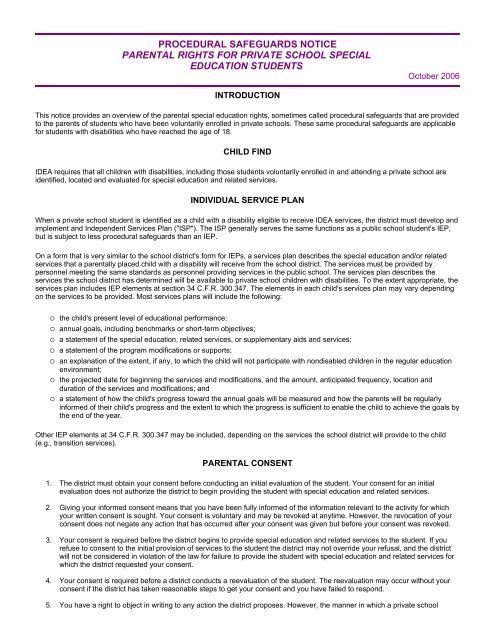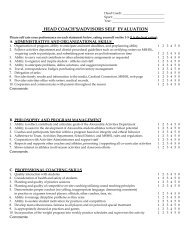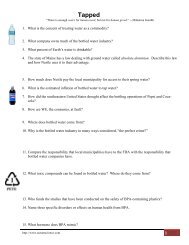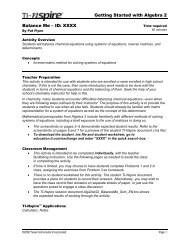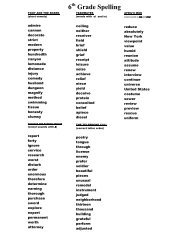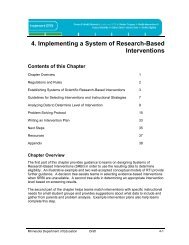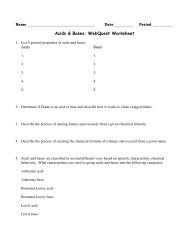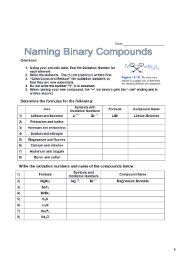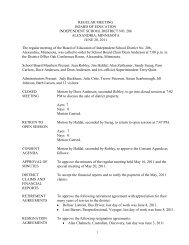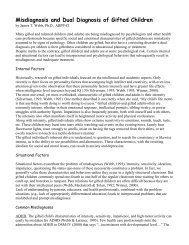procedural safeguards notice parental rights for private school ...
procedural safeguards notice parental rights for private school ...
procedural safeguards notice parental rights for private school ...
You also want an ePaper? Increase the reach of your titles
YUMPU automatically turns print PDFs into web optimized ePapers that Google loves.
PROCEDURAL SAFEGUARDS NOTICE<br />
PARENTAL RIGHTS FOR PRIVATE SCHOOL SPECIAL<br />
EDUCATION STUDENTS<br />
October 2006<br />
INTRODUCTION<br />
This <strong>notice</strong> provides an overview of the <strong>parental</strong> special education <strong>rights</strong>, sometimes called <strong>procedural</strong> <strong>safeguards</strong> that are provided<br />
to the parents of students who have been voluntarily enrolled in <strong>private</strong> <strong>school</strong>s. These same <strong>procedural</strong> <strong>safeguards</strong> are applicable<br />
<strong>for</strong> students with disabilities who have reached the age of 18.<br />
CHILD FIND<br />
IDEA requires that all children with disabilities, including those students voluntarily enrolled in and attending a <strong>private</strong> <strong>school</strong> are<br />
identified, located and evaluated <strong>for</strong> special education and related services.<br />
INDIVIDUAL SERVICE PLAN<br />
When a <strong>private</strong> <strong>school</strong> student is identified as a child with a disability eligible to receive IDEA services, the district must develop and<br />
implement and Independent Services Plan ("ISP"). The ISP generally serves the same functions as a public <strong>school</strong> student's IEP,<br />
but is subject to less <strong>procedural</strong> <strong>safeguards</strong> than an IEP.<br />
On a <strong>for</strong>m that is very similar to the <strong>school</strong> district's <strong>for</strong>m <strong>for</strong> IEPs, a services plan describes the special education and/or related<br />
services that a <strong>parental</strong>ly placed child with a disability will receive from the <strong>school</strong> district. The services must be provided by<br />
personnel meeting the same standards as personnel providing services in the public <strong>school</strong>. The services plan describes the<br />
services the <strong>school</strong> district has determined will be available to <strong>private</strong> <strong>school</strong> children with disabilities. To the extent appropriate, the<br />
services plan includes IEP elements at section 34 C.F.R. 300.347. The elements in each child's services plan may vary depending<br />
on the services to be provided. Most services plans will include the following:<br />
<br />
<br />
<br />
<br />
<br />
<br />
<br />
the child's present level of educational per<strong>for</strong>mance;<br />
annual goals, including benchmarks or short-term objectives;<br />
a statement of the special education, related services, or supplementary aids and services;<br />
a statement of the program modifications or supports;<br />
an explanation of the extent, if any, to which the child will not participate with nondisabled children in the regular education<br />
environment;<br />
the projected date <strong>for</strong> beginning the services and modifications, and the amount, anticipated frequency, location and<br />
duration of the services and modifications; and<br />
a statement of how the child's progress toward the annual goals will be measured and how the parents will be regularly<br />
in<strong>for</strong>med of their child's progress and the extent to which the progress is sufficient to enable the child to achieve the goals by<br />
the end of the year.<br />
Other IEP elements at 34 C.F.R. 300.347 may be included, depending on the services the <strong>school</strong> district will provide to the child<br />
(e.g., transition services).<br />
PARENTAL CONSENT<br />
1. The district must obtain your consent be<strong>for</strong>e conducting an initial evaluation of the student. Your consent <strong>for</strong> an initial<br />
evaluation does not authorize the district to begin providing the student with special education and related services.<br />
2. Giving your in<strong>for</strong>med consent means that you have been fully in<strong>for</strong>med of the in<strong>for</strong>mation relevant to the activity <strong>for</strong> which<br />
your written consent is sought. Your consent is voluntary and may be revoked at anytime. However, the revocation of your<br />
consent does not negate any action that has occurred after your consent was given but be<strong>for</strong>e your consent was revoked.<br />
3. Your consent is required be<strong>for</strong>e the district begins to provide special education and related services to the student. If you<br />
refuse to consent to the initial provision of services to the student the district may not override your refusal, and the district<br />
will not be considered in violation of the law <strong>for</strong> failure to provide the student with special education and related services <strong>for</strong><br />
which the district requested your consent.<br />
4. Your consent is required be<strong>for</strong>e a district conducts a reevaluation of the student. The reevaluation may occur without your<br />
consent if the district has taken reasonable steps to get your consent and you have failed to respond.<br />
5. You have a right to object in writing to any action the district proposes. However, the manner in which a <strong>private</strong> <strong>school</strong>
parent challenges a district's decision or proposal varies according to the nature of the decision or proposal.<br />
6. Generally, your consent is required be<strong>for</strong>e a district may disclose personally identifiably in<strong>for</strong>mation regarding the student or<br />
the student's educational records, but this in<strong>for</strong>mation may be disclosed to individuals within the district who have a<br />
legitimate educational interest in the in<strong>for</strong>mation or are providing services to the student under the IDEA. This in<strong>for</strong>mation<br />
may also be disclosed in accordance with the Family Educational Rights and Privacy Act ("FERPA"), the Minnesota<br />
Government Data Practices Act, the Individuals with Disabilities Education Act ("IDEA"), or other law.<br />
ACCESS TO STUDENT'S EDUCATION RECORDS<br />
If you want to review the student's education records, the district must give you access to the records. The District must allow you to<br />
review the records without unnecessary delay, and be<strong>for</strong>e any meeting regarding an IEP or any due process hearing about the<br />
student.<br />
Your right to inspect and review education records includes the right to:<br />
1. An explanation or interpretation of the student's records from the district upon reasonable requests;<br />
2. Have your representative inspect and review the records on your behalf;<br />
3. Request the district provide copies of the student's education records to you.<br />
The district may not charge a fee to search or retrieve the student's education records. However, if you request copies, the district<br />
may charge a reasonable fee <strong>for</strong> the copies, unless charging that fee would prevent you from exercising your right to inspect and<br />
review the education records. If you request 100 or fewer copies of black and white, letter or legal size paper copies, the district<br />
may not charge more than $.25 per copy.<br />
The district must keep a record of persons accessing the student's special education records. This record must include the persons,<br />
except the parents and district employees, who are given access to the student's educational records. This record of access must<br />
include the name of the person who accessed the records, the date of access and the purpose of the person's access to the<br />
student's educational records.<br />
You may specifically request a copy of all records concerning IEP health-related services disclosed by the district to a third party.<br />
INDEPENDENT EDUCATIONAL EVALUATIONS<br />
An independent educational evaluation ("IEE") is an evaluation by a qualified person who is not an employee of your district. You<br />
may ask <strong>for</strong> an IEE at <strong>school</strong> district expense once the district evaluates the student and you disagree with the district's evaluation.<br />
A hearing officer may also order an independent evaluation of the student at <strong>school</strong> district expense during the pendency of a due<br />
process hearing.<br />
Upon your request <strong>for</strong> an IEE, the district must provide you with in<strong>for</strong>mation about where an IEE may be obtained and the<br />
applicable district criteria <strong>for</strong> an IEE. When you request an IEE, the district must, without delay, ensure that either the IEE is<br />
provided at public expense or request a hearing to determine the appropriateness of the district's evaluation is appropriate, you still<br />
have the right to an independent evaluation, but not at public expense. If you obtain an IEE at your own expense, the results of the<br />
evaluation must be considered by the district and may be presented as evidence at a due process hearing regarding the student.<br />
WRITTEN COMPLAINTS<br />
The Parent of a voluntarily placed <strong>private</strong> <strong>school</strong> student may file a compliant with the Minnesota Department of Education ("MDE")<br />
to challenge any aspect of a district's provision of special education and related services to the <strong>private</strong> <strong>school</strong> student as well as the<br />
district's provision of a free appropriate education to the student. A complaint sent to MDE must:<br />
1. Be in writing and be signed by the individual or organization filling the complaint;<br />
2. Allege violations of special education law or rules that have occurred within two years of the date the complainant knew or<br />
should have known about the alleged action that <strong>for</strong>ms the basis of the complaint.<br />
3. State the facts upon which the allegation is based; and<br />
4. Include the name, address, and telephone number of the complainant.<br />
The complaint must be sent to:<br />
Minnesota Department of Education<br />
Division of Compliance and Assistance<br />
Due Process Supervisor<br />
1500 West Highway 36<br />
Roseville, MN 55113-4266
(T)651-582-8689 (F)651-582-8725<br />
MDE will issue a written decision within 60 days. The final complaint decision may be appealed to the Minnesota Court of Appeals<br />
within 60 days of the date the decision is issued.<br />
MEDIATION AND IMPARTIAL DUE PROCESS HEARINGS<br />
The parents of voluntary placed <strong>private</strong> <strong>school</strong> students have very limited <strong>rights</strong> in regards to due process hearings and other<br />
dispute resolution proceedings. A due process hearing may only be requested about matters relating to child find and their child's<br />
evaluation and eligibility determination.<br />
Parents may not request mediation or a due process hearing about other matters relating to <strong>parental</strong>ly-placed <strong>private</strong> <strong>school</strong><br />
children, including the provision of services in the child's services plan. Due process does not apply because there is no individual<br />
right to special education services <strong>for</strong> a child attending <strong>private</strong> <strong>school</strong> identification and/or evaluation of a disabled student under<br />
IDEA.<br />
Impartial due process hearings must be requested in writing within two years of the date your or the district knew or should have<br />
known about the alleged action that <strong>for</strong>ms the basis of the complaint. A request <strong>for</strong> a hearing must be sent to MDE and to the<br />
involved <strong>school</strong> district.<br />
The MDE will appoint an impartial hearing officer to conduct the due process hearing. If the MDE is the provider of services to the<br />
student, the MDE will request the Office of Administrative Hearings to appoint a qualified hearing officer.<br />
Request <strong>for</strong> Due Process Hearing<br />
The request <strong>for</strong> a due process hearing must include:<br />
1. The name of the student;<br />
2. The address of the student;<br />
3. The name of the <strong>school</strong> the student is attending;<br />
4. A description of the nature of the problem(s) of the student causing you to request the hearing, including facts relating to such<br />
problem(s); and<br />
5. A proposed resolution of the problem to the extent known to you.<br />
Resolution Session<br />
When you request a hearing, the district must arrange <strong>for</strong> a resolution session to occur within 15 days after receiving the hearing<br />
request. The resolution session is an opportunity <strong>for</strong> you to discuss your complaint with the district and gives the district an<br />
opportunity to resolve the complaint. The resolution session must include you and relevant members of the IEP team. If an<br />
agreement is reached during the resolution session, you and the district must execute a legally binding agreement stating the<br />
resolution. Either party may void the agreement within three business days of signing the agreement.<br />
The requirement <strong>for</strong> this resolution session may only be waived if (1) both you and the district agree to mediation; or (2) both you<br />
and the district agree to waive the resolution session requirement in writing. If you do not attend a resolution meeting or mediation,<br />
you are not entitled to a hearing.<br />
Disclosure of Additional Evidence Be<strong>for</strong>e a Hearing<br />
At least five business days be<strong>for</strong>e a hearing, you and the district must disclose to each other any evidence that you intend to use at<br />
the hearing, including, but not limited to, all evaluations of the student completed by that date as well as any recommendations<br />
based on those evaluations. A hearing officer may refuse to allow you to introduce any undisclosed evidence at the hearing unless<br />
the other party consents. All evidence must be limited to the specific issues described in the request <strong>for</strong> a due process hearing.<br />
Your Rights During Hearing<br />
Both you and the district have the right to:<br />
1. Be accompanied and advised by an attorney and by individuals with special knowledge or training with respect to the<br />
problems of students with disabilities;<br />
2. Present evidence;<br />
3. Confront, cross-examine, and compel the attendance of witnesses;<br />
4. Prohibit the introduction of any evidence at the hearing that has not been disclosed at least five business days be<strong>for</strong>e the<br />
hearing including, but not limited to, evaluation data and recommendations based on that data;<br />
5. Receive a written copy of the hearing transcript, or at your discretion, an electronic, verbatim record of the hearing; and<br />
6. Receive a written copy of the hearing officer's findings of fact and decision, or at your discretion, an electronic version of the<br />
findings of fact and decision.<br />
As a parent, you have the right to:<br />
1. Have the student who is the subject of the hearing present;
2. Open the hearing to the public; and<br />
3. Notice the time, date, and place of the hearing from the hearing officer at least ten calendar days in advance of the hearing.<br />
Hearing Process<br />
The hearing must be held at a location within the district responsible <strong>for</strong> ensuring a free appropriate public education is provided to<br />
the student.<br />
The burden of proof at the hearing is on the district to demonstrate, by a preponderance of the evidence, that it has complied with<br />
its child find responsibilities under IDEA and/or has appropriately evaluated the student.<br />
The hearing officer will make a written decision based only on evidence received and introduced in the record at the hearing not<br />
more than 45 calendar days from the expiration of the resolution period. Extensions may be available under some circumstances if<br />
the requesting party can show good cause. The proposed action or refusal will be upheld only upon a showing by the district by a<br />
preponderance of the evidence.<br />
You have the burden of proving, by a preponderance of the evidence, that services <strong>for</strong> which you are paying or have paid, and <strong>for</strong><br />
which you are seeking public funds, are appropriate <strong>for</strong> the student.<br />
Attorneys' Fees <strong>for</strong> Hearings<br />
You may be able to recover your attorney' fees if you prevail in a due process hearing or further civil action. A petition <strong>for</strong> fees must<br />
be filed in a court of competent jurisdiction. A judge may make an award of attorneys' fees based on prevailing rates in your<br />
community. The court may reduce an award of attorneys' fees if it finds that you unreasonably delayed the settlement or decision in<br />
the case.<br />
If the district prevails and a court agrees that your request <strong>for</strong> a hearing was <strong>for</strong> any improper purpose, s such as to harass the<br />
district, you may be required to pay the district's attorneys' fees.<br />
Civil Action<br />
The independent hearing officer's decision is final unless you or the district files a civil action. If you or the district disagrees with the<br />
findings or decisions made by a hearing officer, either party may file a court action. The action may be brought in a federal district<br />
court or the Minnesota Court of Appeals. Different Standards of review apply in each court. An appeal to the state Court of Appeals<br />
must be made within 60 days of the decision. An appeal to a federal district court must be made within 90 days of the date of the<br />
decision. The statute of limitations <strong>for</strong> bringing claims under the Individuals with Disabilities Act is two years.<br />
FOR MORE INFORMATION<br />
If you need help in understanding this <strong>notice</strong> or anything about the student's education, please contact the administration at the<br />
student's <strong>school</strong>, the district's special education director, or the person or the agencies listed below. As indicated above, this <strong>notice</strong><br />
is a general overview of <strong>private</strong> <strong>school</strong> <strong>parental</strong> special education <strong>rights</strong> as of November 2005, and is not intended to address a<br />
parent's specific <strong>rights</strong> in a particular factual situation.<br />
If you have any questions or would like further in<strong>for</strong>mation, please contact:<br />
Name: Gary O. Jones<br />
Phone:<br />
866-687-2732<br />
For additional assistance, you may contact any of the groups listed below:<br />
ARC Minnesota<br />
http://www.arcminnesota.com<br />
(651) 523-0823<br />
(800) 582-5256<br />
PACER<br />
http://www.pacer.org/<br />
(952) 838-9000<br />
(800) 537-2237<br />
(952) 838-0190 (TTY)<br />
Minnesota Disabilities Law Center<br />
http://www.mndlc.org/<br />
(612) 332-1441<br />
(800) 292-4150<br />
(612) 332-4668 (TTY)<br />
Minnesota Department of Education<br />
http://www.education.state.mn.us<br />
(651) 582-8689<br />
(651) 582-8201 (TTY)


